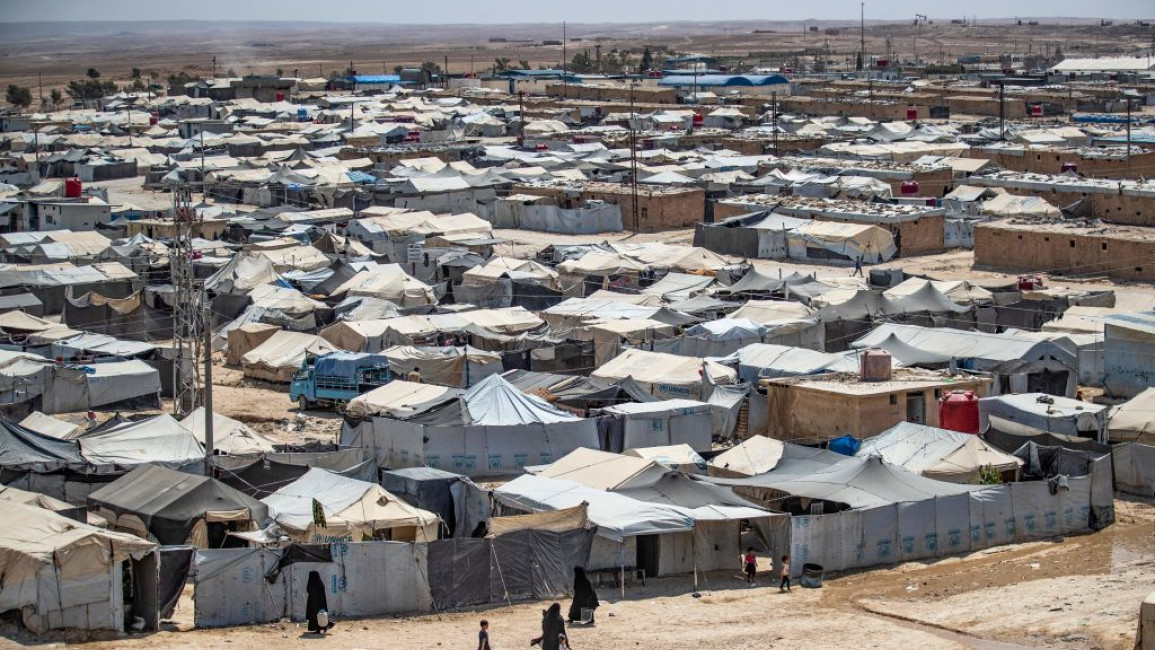Norwegian Refugee Council suspends activities in Syrian camp after 'threats': report
The Norwegian Refugee Council (NRC) has temporarily suspended activities at the Al-Hol camp in Syria, due to threats made towards their staff, according to the aid group.
A source from the NRC told local Kurdish media outlet North Press Agency that activities would be suspended at the northeastern Syrian refugee camp until Saturday.
It was possible the NRC might permanently suspend activities in one sector of the camp due to risks, they said.
Masked gunmen reportedly threatened NRC employees on Thursday, demanding they pay a "jizya tax" - a traditional levy on non-Muslims living in areas under Islamic law.
The masked gunmen demanded that the NRC pay $300 for each employee inside the camp, and $500 for its employees who are working outside Al-Hol.
"We confirm that part of our remotely managed emergency work in Al Hol has been suspended after an armed masked man entered an education learning centre where we were delivering emergency education and other humanitarian activities, threatening our staff and asking them for money on 26 August. No one was physically harmed in the incident," the NRC told The New Arab.
"We condemn this criminal behaviour which, besides targeting aid workers, is also depriving families who are badly in need of our services," they continued.
The Norwegian Refugee Council provides the camp's residents with educational services, WASH facilities, and operates a special office for legal advice.
Al-Hol is located in northeastern Syria, in an area controlled by the Kurdish-run Autonomous Administration. It is split into 11 sectors and holds 50,000 residents, including family members of Islamic State group fighters.
US CENTCOM recently claimed that the IS continues to have a strong presence in the camp.
The camp has been plagued by violence and killings with more than 40 murders recorded in the first quarter of 2021. There have been 30 more documented killings since mid-April.
The unstable security situation in the camp has forced the Kurdish security forces to limit their presence to the boundaries of the camp.
The issue of violence in Al-Hol was recently raised by Under-Secretary-General for Humanitarian Affairs and Emergency Relief Coordinator Martin Griffiths.
He said that the violence, particularly against women and girls, is increasing the suffering of residents in the camp.
"Killings of and threats to women and girls in the camp increased in June and July, contributing further to a climate of fear," Griffiths said.
"And the dire needs in the camp, and the extreme vulnerability and aid dependence of residents in the camp increases the risk of sexual exploitation and abuse."
He also highlighted how humanitarian workers, including protection volunteers and camp management staff, continue to "face regular threats".
"We are following the situation closely to make informed decisions about our programmes keeping the safety of our colleagues as our top priority," the NRC explained to The New Arab.
European countries have been urged by international organisations to repatriate their citizens living in northeastern Syria and experiencing appalling conditions in the camps.
They are often trapped in legal limbo and unable to return to their homes.


![Minnesota Tim Walz is working to court Muslim voters. [Getty]](/sites/default/files/styles/image_684x385/public/2169747529.jpeg?h=a5f2f23a&itok=b63Wif2V)




![Debris near Rafic Hariri International Airport [Getty]](/sites/default/files/styles/image_212x120/public/2176162423.jpeg?h=a5f2f23a&itok=XLiO6WHk)
![An Israeli air strike on Jabalia killed teenage journalist Hassan Hamad [Screengrab/X]](/sites/default/files/styles/image_212x120/public/2024-10/hassan%20hamad1.jpg?h=c12e0b96&itok=KstD_5xk)
